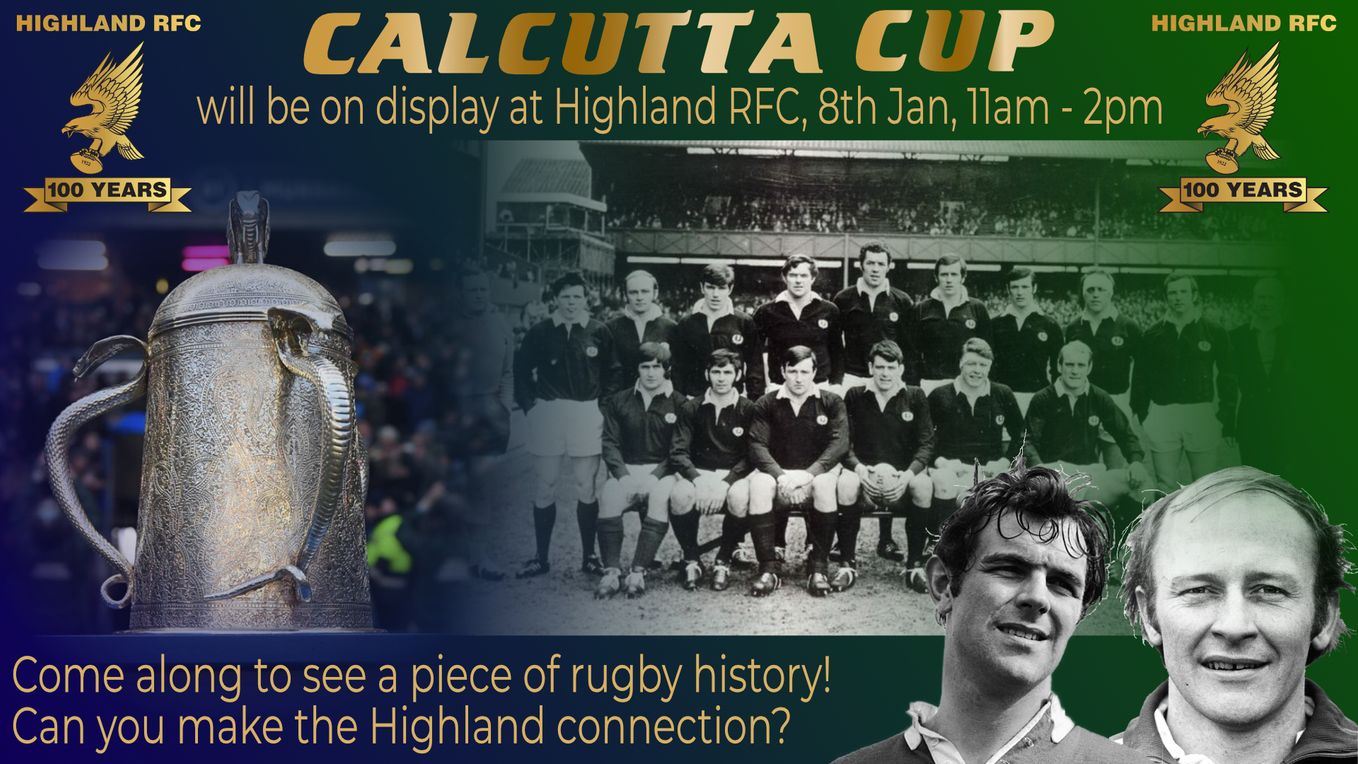Come along and see a piece of rugby history : 11am-2pm
Calcutta Cup visits Highland RFC
As part of Highland RFC’s Centenary celebrations Scottish Rugby will be displaying the Calcutta Cup at the Club on Saturday 8th January between 11am and 2pm.
Please note COVID measures will be in place – so please sign in and out of the club in the usual way (TAAP Visitor Book App) make sure you remember your mask.
It would be fantastic to have you to come along to see this important piece of rugby history as it’s not often seen outside of its twin homes of Murrayfield and Twickenham.
Scotland are the current holders of the trophy after their sensational win at Twickenham in last years 6 Nations, which was the first time that Scotland had won there since 1983 – a period of 38 years.
Highland RFC does have connections to this famous rugby trophy, and they are associated with another famous week in Scottish Rugby history.
Back in 1971 the situation faced by the Scotland rugby team was not that dissimilar to that faced by last years Scotland team. Scotland went into their game at Twickenham in the knowledge that Scotland’s last win at Twickenham was the “Wilson Shaw” match of 1938, some 33 years earlier.
As it turns out Chris Rea scored a try in the dying seconds off the game, leaving a tricky conversion for No 8 and Captain Peter Brown to snatch the win.
From a position about half-way between the touchline and posts, Brown wiped his nose on his jersey and with a head-on kicking style blootered the ball through the uprights to mark a famous Scotland victory. Full-Time: England 15-16 Scotland
One week later at Murrayfield, with exactly the same team, in a match to mark the centenary of international rugby, Scotland won again against England, this time by a margin of 26-6. With John Frame scoring the opening try after only 13 seconds, it was Scotlands fastest ever International try until John Leslie’s try against Wales in 1999.
One of the notable facts about these Scotland teams is that there were six Gala players – Arthur Brown, John Frame, Jock Turner, Duncan Paterson, Peter Brown and Nairn McEwan – involved in both games.
Of those, John Frame was an Inverness born player. He was educated at Glenalmond, and subsequently Edinburgh University. He won the first of his 23 caps against New Zealand in 1967 out of the University Club. On completion of his studies not being a member of a FP club meant there were limited opportunities to continuing playing in Edinburgh, John accepted an invitation from Jock Turner to join Gala. It’s also notable that John was a reserve player for the British and Irish Lions 1971 tour to Australia and new Zealand.
John scored 2 tries in the 2nd, 26-6, victory over England in 1971. He said of his first try it was probably scored nearer to 10 seconds than the reported 13 – I don’t doubt him for a minute . There is always a silver lining as John’s first try remains the fastest try scored against England – that’ll do nicely.
So what’s the connection? Well John played for Highland when breaks in his university studies allowed a return to Inverness. However, his strongest connection is with a very successful 7’s team featuring Jack Barrie, Stevie Fraser, Scourie Neil MacDonald, Malcolm Rankine, Bill Golightly, Tom McMenemy, and John himself. They won our home 7’s tournament as well as the Elgin 7’s.
As to the other link, many of you will recognise the name Nairn MacEwan, and his connection with Highland is clear.
You may also have heard of his remarkable commitment to rugby. Nairn had been involved with Highland since his arrival in the area around 1964. He realised, if he wanted Scotland caps, which he did, he would have to be playing club rugby at a higher level than with Highland, so he joined Gala. This started a tough schedule of twice-weekly journeys from Inverness to Galashiels for training, then Saturday trips to wherever Gala were playing. This would be a remarkable feat now, never mind in the days prior to the A9 road improvements of the mid to late 1970’s. Nairn won 20 Scotland Caps.
Then in season 1973/74 Nairn returned to Highland to play and coach and create a bit more history by instilling a bit of grit and determination, as well as improve the skills of his charges that led to an unprecedented period of success for Highland and creating a lasting legacy.
If you can make it down to the club on Saturday to see the cup it maybe makes it better knowing that Highland RFC has played a part in its history.
As we approach the 2022 6 Nations I’m pretty sure the vast majority of the club membership will be hoping that we can retain the Cup in our 6 Nations opener against England on Feb 5th.
